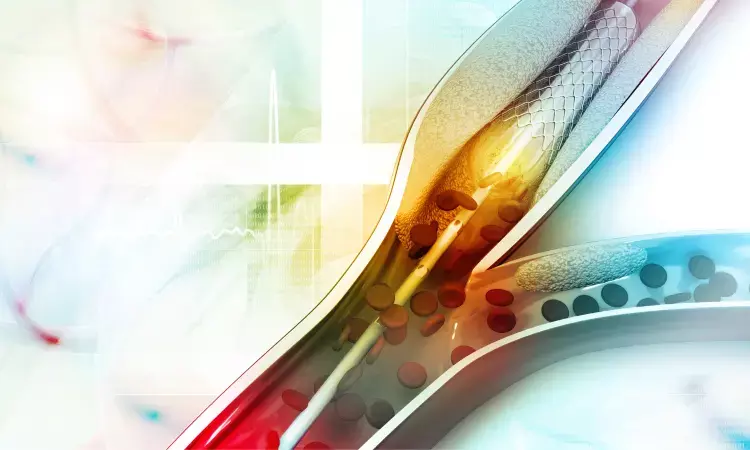- Home
- Medical news & Guidelines
- Anesthesiology
- Cardiology and CTVS
- Critical Care
- Dentistry
- Dermatology
- Diabetes and Endocrinology
- ENT
- Gastroenterology
- Medicine
- Nephrology
- Neurology
- Obstretics-Gynaecology
- Oncology
- Ophthalmology
- Orthopaedics
- Pediatrics-Neonatology
- Psychiatry
- Pulmonology
- Radiology
- Surgery
- Urology
- Laboratory Medicine
- Diet
- Nursing
- Paramedical
- Physiotherapy
- Health news
- Fact Check
- Bone Health Fact Check
- Brain Health Fact Check
- Cancer Related Fact Check
- Child Care Fact Check
- Dental and oral health fact check
- Diabetes and metabolic health fact check
- Diet and Nutrition Fact Check
- Eye and ENT Care Fact Check
- Fitness fact check
- Gut health fact check
- Heart health fact check
- Kidney health fact check
- Medical education fact check
- Men's health fact check
- Respiratory fact check
- Skin and hair care fact check
- Vaccine and Immunization fact check
- Women's health fact check
- AYUSH
- State News
- Andaman and Nicobar Islands
- Andhra Pradesh
- Arunachal Pradesh
- Assam
- Bihar
- Chandigarh
- Chattisgarh
- Dadra and Nagar Haveli
- Daman and Diu
- Delhi
- Goa
- Gujarat
- Haryana
- Himachal Pradesh
- Jammu & Kashmir
- Jharkhand
- Karnataka
- Kerala
- Ladakh
- Lakshadweep
- Madhya Pradesh
- Maharashtra
- Manipur
- Meghalaya
- Mizoram
- Nagaland
- Odisha
- Puducherry
- Punjab
- Rajasthan
- Sikkim
- Tamil Nadu
- Telangana
- Tripura
- Uttar Pradesh
- Uttrakhand
- West Bengal
- Medical Education
- Industry
Novel outpatient balloon pulmonary angioplasty protocol safe and effective in CTE pulmonary hypertension

Michigan: A study published in JSCAI, the official journal of the Society for Cardiovascular Angiography and Interventions, has presented a minimally invasive outpatient balloon pulmonary angioplasty protocol. According to the study's researchers, this protocol is efficacious and is associated with low complication rates requiring inpatient hospitalization among patients with chronic thrombo-embolic pulmonary disease (CTEPD) and chronic thromboembolic pulmonary hypertension (CTEPH).
It is already known that Balloon pulmonary angioplasty is currently performed at expert centres worldwide. The procedure treats patients with chronic thromboembolic pulmonary hypertension (CTEPH) and symptomatic chronic thromboembolic pulmonary disease (CTEPD), improving both parameters: symptoms and hemodynamics. The procedure has associated risks and complications like vascular injury and pulmonary oedema. The current practice standard is inpatient postprocedural monitoring for 24 to 72 hours.
A team of researchers evaluated the safety and efficacy of BPA in a cohort of CTEPD and CTEPH patients and outlined a protocol for implementation in the outpatient setting.
The Michigan Medicine Outpatient Balloon Pulmonary Angioplasty Protocol can be summarised as follows:
Pre-procedure:
- Imaging evaluation.
- Individual patient clinical and anatomic risk stratification.
- Multidisciplinary CTEPH team evaluation.
- Hemodynamic optimization with pulmonary vasodilators.
Intra-procedure:
- Utilize light sedation.
- Limit interventions to 3-4 unilateral pulmonary segments per procedure.
- Subselective segmental angiography for lesion characterization.
- Dilatation until brisk venous return is established.
- Adjunctive pressure-wire dilation guidance
- Diluted contrast is limited to 3× the patient's GFR per procedure.
- Radiation exposure is limited to 2 Gy per procedure.
- Advanced airway, interventional and invasive contingencies on standby.
Post-procedure:
- Immediate post-procedural chest x-ray.
- 2 hours of bed rest
- After 2 hours, initiation of anticoagulation with IV heparin.
- 8-12 hours of specialized nursing monitoring in the observational unit.
- Follow up via teleconsultation after finishing 2 BPA sessions.
The Results could be summarised as:
- Eighteen patients underwent 78 BPA sessions in total.
- The improvement in World Health Organization, functional class, and mean improvement in 6-minute walking distance of +67 m was recorded.
- There was an improvement in hemodynamic parameters with a mean decrease in mean pulmonary artery pressure and pulmonary vascular resistance of 7.3 ± 5.8 mm Hg and 1.7 ± 1.5 Wood units, respectively.
- There were low Complication rates.
- 3/78 patients constituting 3.9 %, developed scant hemoptysis.
- One patient had a vascular injury requiring inpatient hospitalization.
They said BPA is safe and effective while performed in the outpatient setting with a standardized protocol with readily available contingencies. Our protocol was borne out of necessity due to healthcare constraints of the COVID-19 pandemic."
The study's limitations include limited patients and standardization of medical therapy, which was not uniform across all patients.
Our results demonstrated improvements in parameters and had low complication rates attributed to an experienced, multidisciplinary BPA team with refined technical expertise comparable with those reported based on multicenter registries, they wrote.
"We do not recommend new programs initiating BPA implement our outpatient postprocedural monitoring. Instead, they wrote that it should be implemented once enough experience is obtained".
Further reading:
Safe and Effective Balloon Pulmonary Angioplasty in the Outpatient Setting: The Michigan Medicine Experience. https://doi.org/10.1016/j.jscai.2023.100589
BDS, MDS in Periodontics and Implantology
Dr. Aditi Yadav is a BDS, MDS in Periodontics and Implantology. She has a clinical experience of 5 years as a laser dental surgeon. She also has a Diploma in clinical research and pharmacovigilance and is a Certified data scientist. She is currently working as a content developer in e-health services. Dr. Yadav has a keen interest in Medical Journalism and is actively involved in Medical Research writing.
Dr Kamal Kant Kohli-MBBS, DTCD- a chest specialist with more than 30 years of practice and a flair for writing clinical articles, Dr Kamal Kant Kohli joined Medical Dialogues as a Chief Editor of Medical News. Besides writing articles, as an editor, he proofreads and verifies all the medical content published on Medical Dialogues including those coming from journals, studies,medical conferences,guidelines etc. Email: drkohli@medicaldialogues.in. Contact no. 011-43720751


